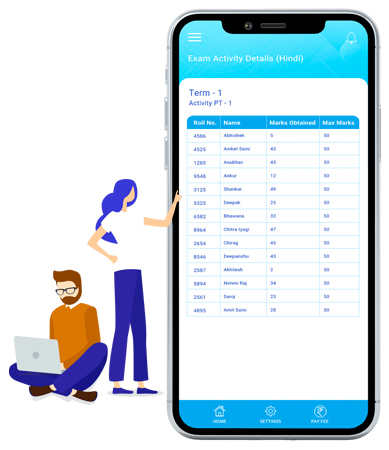An Examination Management module in a School Management System (SMS) or School ERP plays a critical role in efficiently managing the entire examination and assessment process.
Here are key features and benefits of such a module:
Features
1. Timely Grade Entry
- Allows teachers to enter examination marks and grades promptly once assessments are completed.
2. Flexible Assessment Types
- Supports various types of assessments, including exams, quizzes, assignments, and projects.
3. Grading System
- Configurable grading system to define grade scales and scoring methods.
4. Subject-wise and Class-wise Records
- Stores assessment data for individual subjects, classes, and students.
5. Customizable Assessment Parameters
- Customize assessment parameters like weightage, total marks, and assessment criteria for different exams and activities.
6. Exam Schedule
- Publishes an exam schedule with dates, timings, and exam venues for students and parents.
7. Report Card Generation
- Automatically generates report cards based on assessment data, allowing for customization of report card formats.
8. Result Analysis
- Provides tools for result analysis, including graphical representations, to identify trends and areas for improvement.
9. Parent Access
- Enables parents to view and download their child's report cards and assessment results through a secure portal or mobile app.
10. Teacher Collaboration
- Allows teachers to collaborate on assessment design, grading, and evaluation.
11. Bulk Data Entry
- Supports bulk data entry for large classes or groups of students to save time.
12. Data Backup and Security
- Ensures data backup and robust security measures to protect assessment data.
13. Report Generation
- Generates various reports, such as class-wise, subject-wise, and student-wise performance reports.
Benefits
- Efficiency: Streamlines the examination process, from assessment creation to result generation.
- Accuracy: Reduces the likelihood of manual errors in result calculation and report card generation.
- Customization: Offers flexibility in defining assessment parameters, grading scales, and report card formats to suit the school's requirements.
- Transparency: Parents and students have easy access to assessment results, leading to increased transparency in the education process.
- Data-Driven Decision-Making: Provides data and analysis tools for educators and school administrators to make informed decisions about curriculum and student performance.
- Time Savings: Automation of result generation and report card printing saves time for teachers and administrative staff.
- Parental Engagement: Engages parents in their child's academic progress by giving them access to real-time assessment data.
- Control: School administrators have full control over the examination and assessment process, ensuring consistency and adherence to school policies.
An Examination Management module in a School ERP enhances the efficiency and effectiveness of the assessment process, facilitating better communication and data-driven decision-making for the school.



